What is CRM Analytics? A Complete Guide for Businesses
In today’s fast-paced business environment, making informed decisions is critical for success. Salesforce CRM Analytics emerges as a game-changing solution for businesses looking to leverage their data effectively. This blog explores what Salesforce CRM Analytics is, its key features, and why your business needs it.
What is Salesforce CRM Analytics?

crm analytics
Salesforce CRM Analytics is an advanced data analysis tool designed to integrate seamlessly with Salesforce CRM. It empowers businesses to turn raw data into actionable insights, enhancing decision-making and operational efficiency. This platform combines powerful features like dashboards, AI-driven insights, and predictive analytics to help organizations stay ahead in a competitive landscape.
By offering a unified view of customer data and business operations, Salesforce CRM Analytics ensures that decision-makers can access the information they need in real time.
Key Features of Salesforce CRM Analytics
a.) Real-Time Data Visualization
Salesforce CRM Analytics provides interactive dashboards and real-time reporting, ensuring that users can track performance metrics instantly.
b.) AI and Machine Learning Integration
With Einstein Analytics, Salesforce adds predictive analytics and AI-powered insights, enabling businesses to anticipate trends and customer behavior.
c.) Customizable Dashboards
Tailor the analytics experience to your specific business needs by creating dashboards that highlight the metrics most relevant to your goals.
d.) Seamless Integration
Salesforce CRM Analytics integrates with third-party tools and apps, making it easier to gather and analyze data from multiple sources in one place.
Benefits of Using Salesforce CRM Analytics
a.) Enhanced Decision-Making:
Access to real-time, data-driven insights allows businesses to make smarter, faster decisions.
b.) Improved Customer Understanding:
Gain a deeper understanding of customer needs and preferences, leading to better-targeted campaigns.
c.) Increased Efficiency:
Automate reporting and streamline processes to save time and reduce errors.
d.) Predictive Analytics:
Use AI to forecast sales trends, customer behavior, and market changes, enabling proactive strategies.
e.) Team Collaboration:
Share insights across departments to foster better collaboration and alignment on goals.
Why Your Business Needs Salesforce CRM Analytics
Without robust analytics, businesses face challenges like data silos, manual reporting, and lack of actionable insights. Salesforce CRM Analytics addresses these pain points by providing a unified platform for data analysis.
For example, companies using Salesforce CRM Analytics have reported significant improvements in sales forecasting accuracy and customer retention rates. By leveraging predictive analytics, businesses can identify growth opportunities and mitigate risks more effectively.
Steps to Get Started with Salesforce CRM Analytics
a.) Set Clear Goals:
Define what you aim to achieve with analytics, such as increasing sales, improving customer satisfaction, or streamlining operations.
b.) Ensure Data Readiness:
Organize and clean your data to ensure accuracy and relevance.
c.) Customize Your Dashboards:
Tailor your dashboards to focus on the KPIs that matter most to your business.
d.) Train Your Team:
Invest in training to ensure your team understands how to use the analytics tools effectively.
Conclusion
Salesforce CRM Analytics is more than just a data tool; it’s a strategic advantage for businesses looking to thrive in a data-driven world. By providing actionable insights and fostering smarter decision-making, it empowers organizations to stay competitive and achieve sustainable growth.
Ready to take your business to the next level? Explore Salesforce CRM Analytics today or consult a Salesforce expert to get started!

